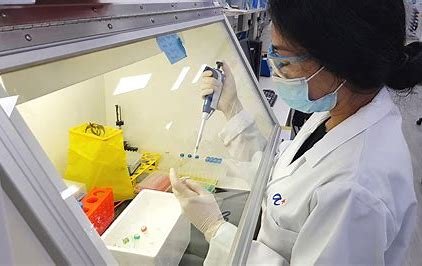Made-In-Singapore Cancer Drug ETC-159 Advances In Clinical Trials
06 June 2022 | Monday | News

Image Source : Public Domain
A made-in-Singapore cancer drug, ETC-159, has advanced into the dose expansion portion of its Phase 1B clinical trial. The Phase 1B dose expansion study tests the preliminary efficacy and safety of ETC-159 in a subset of genetically defined patients with microsatellite stable (MSS)1 cancers. MSS tumours have few genetic aberrations and patients are usually unresponsive to immunotherapy like pembrolizumab, a checkpoint inhibitor used in the treatment of many cancers. To date, the first portion of the Phase 1B trial, the dose escalation study, has been completed and a safe dose of ETC-159 in combination with pembrolizumab has been defined. ETC-159 was previously shown to be safe as a monotherapy in its Phase 1A trial.
ETC-159 was jointly developed by Duke-NUS Medical School (Duke-NUS) and the Experimental Drug Development Centre (EDDC), a national platform for drug discovery and development hosted by the Agency for Science, Technology and Research (A*STAR). This small molecule drug targets a range of solid tumours including colorectal, endometrial, ovarian and pancreatic cancers, which contribute to a significant fraction of Singapore’s cancer burden. A subset of these cancers are caused by hyperactivity in a cell signalling pathway known as the Wnt pathway.
The Phase 1B dose expansion study will have two groups.
- In one group, ETC-159 will be tested as a monotherapy in MSS colorectal cancer (CRC) patients who have a specific genetic mutation, called “RSPO Fusion”. This mutation is present in about 8% of CRC patients and it activates the Wnt pathway, making these patients sensitive to Wnt inhibitors like ETC 159. A diagnostic test designed by EDDC was manufactured and clinically validated at POLARIS @ A*STAR’s Genome Institute of Singapore (GIS). Supported by the Diagnostics Development (DxD) Hub, this test will be used to select colorectal cancer patients with RSPO Fusion to participate in the trial. RNA Extraction from Formalin-Fixed Paraffin-Embedded (FFPE)2 tissue samples followed by testing of Fusion genes will be done at POLARIS @ GIS.
2 A technique used to preserve and prepare tissue specimens (e.g.: samples from cancer biopsies) for examination, research or drug/diagnostic development.
2
ETC-159 Dose Expansion – News Update
- In the second dose expansion patient group, ETC-159 will be tested in combination with the immune checkpoint inhibitor pembrolizumab in MSS colorectal cancer patients who do not have RSPO fusions, as well as in patients with MSS endometrial and MSS ovarian cancers. The ability of ETC 159 to sensitise MSS cancers to pembrolizumab will be investigated. The combination of ETC-159 and pembrolizumab has been demonstrated to be synergistic in preclinical studies.
EDDC Development team discussing the ETC-159 dose expansion study
As in earlier trials, investigators will track the biological effect of ETC-159, also known as its pharmacodynamics, in patients participating in the dose expansion study. The pharmacodynamics of a drug can be measured from tumour samples taken through biopsies, such as during surgery or an invasive procedure. EDDC established that it will also be possible to measure the pharmacodynamics of the drug through monitoring the levels of Axin2 mRNA in hair follicles. Axin2 is a downstream protein in the Wnt pathway, and its levels are reduced when ETC-159 effectively acts on the pathway. This minimally invasive measurement of ETC-159’s biological effect will allow investigators to understand how well the drug is working in patients over the course of study.
Patients for the dose expansion study will come from two sites in Singapore as well as seven sites in the United States. The trial is expected to be completed by 2024.
Most Read
- How Does GLP-1 Work?
- Innovations In Magnetic Resonance Imaging Introduced By United Imaging
- Management of Relapsed/Refractory Multiple Myeloma
- 2025 Drug Approvals, Decoded: What Every Biopharma Leader Needs to Know
- BioPharma Manufacturing Resilience: Lessons From Capacity Expansion and Supply Chain Resets from 2025
- APAC Biopharma Review 2025: Innovation, Investment, and Influence on the Global Stage
- Top 25 Biotech Innovations Redefining Health And Planet In 2025
- The New AI Gold Rush: Western Pharma’s Billion-Dollar Bet on Chinese Biotech
- Single-Use Systems Are Rewiring Biopharma Manufacturing
- The State of Biotech and Life Science Jobs in Asia Pacific – 2025
- Asia-Pacific Leads the Charge: Latest Global BioSupplier Technologies of 2025
- Invisible Threats, Visible Risks: How the Nitrosamine Crisis Reshaped Asia’s Pharmaceutical Quality Landscape
Bio Jobs
- Sanofi Turns The Page As Belén Garijo Steps In And Paul Hudson Steps Out
- Global Survey Reveals Nearly 40% of Employees Facing Fertility Challenges Consider Leaving Their Jobs
- BioMed X and AbbVie Begin Global Search for Bold Neuroscience Talent To Decode the Biology of Anhedonia
- Thermo Fisher Expands Bengaluru R&D Centre to Advance Antibody Innovation and Strengthen India’s Life Sciences Ecosystem
- Accord Plasma (Intas Group) Acquires Prothya Biosolutions to Expand Global Plasma Capabilities
- ACG Announces $200 Million Investment to Establish First U.S. Capsule Manufacturing Facility in Atlanta
- AstraZeneca Invests $4.5 Billion to Build Advanced Manufacturing Facility in Virginia, Expanding U.S. Medicine Production
News











